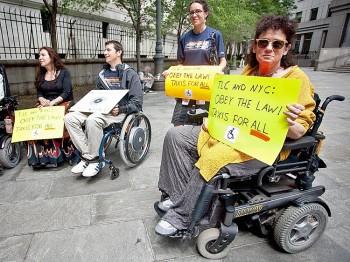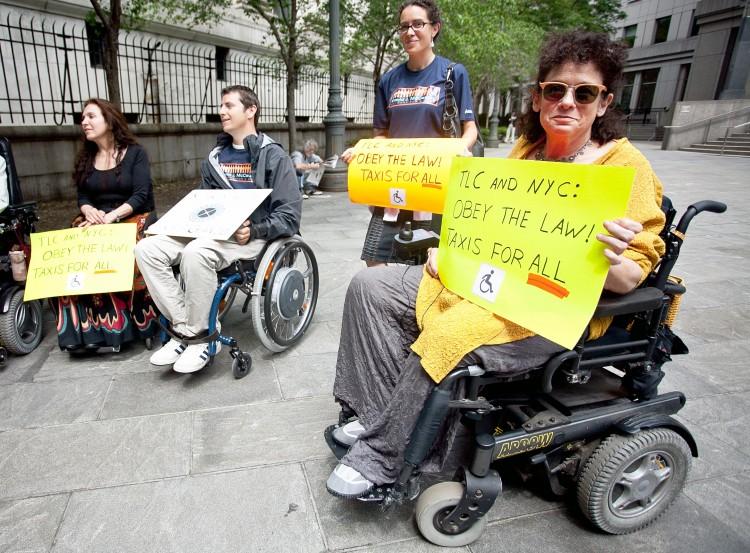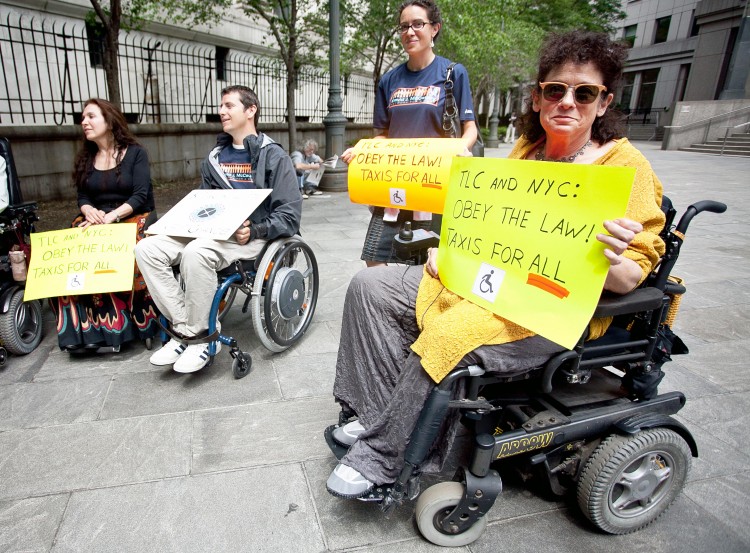NEW YORK—A motion that attempted to deny a class action lawsuit brought against the Taxi and Limousine Commission (TLC) for discrimination against disabled New Yorkers was dismissed on Tuesday.
Both parties were ordered to work together to find creative solutions to the vexing problem of access to taxis for wheelchair-bound passengers.
Disabled people often cannot access taxis, one of the city’s main forms of transportation, because they are not adequately equipped, argued Sid Wolinsky, director of Litigation for Disability Rights Advocates (DRA), who represented the plaintiffs.
“It’s blatant discrimination. It compromises my work life and personal life and my health and well-being,” said Simi Linton, one of the group of plaintiffs who brought the class action against the TLC.
Out of New York’s 13,000-plus taxis, only about 2 percent, or around 233, can be accessed by disabled people, Wolinsky pointed out. The chance of happening upon one of these taxis is almost impossible.
Compounding the problem is that the medallions issued to these taxis are small, posted on the back of the taxi, and difficult to see in the daytime, not to mention at night.
“There are fewer and fewer cabs on the street that I can get into and out of,” stated Jesse Lemisch, professor emeritus of history at John Jay College of Criminal Justice, who wrote an article in The Nation magazine on the subject. “Every day it’s getting worse. My mobility is radically decreased because of that.”
Wolinsky and the plaintiffs pointed out that all of London’s more than 19,000 black cabs are wheelchair accessible, with the first ones being introduced in 1987. This means that it would not be inconceivable for New York to do the same, or at least incorporate wheelchair accessibility into the Taxi of Tomorrow plan for New York’s new fleet of taxis.
The selection process for the Taxi of Tomorrow recently ended with the Nissan NV200 winning the contract. Wolinsky said that this is unacceptable because the vehicle has no wheelchair access.
The Karsan model, one of the three finalists, is fully wheelchair accessible, which is more in line with the goal of “universal accessibility for all users with a goal of meeting ADA guidelines” (wheelchair accessible), according to the Taxi of Tomorrow website.
Wolinsky and the representative for the TLC presented their respective oral arguments while the judge pressured them to better express their cases. “Both of you are hard to pin down,” he said.
The TLC side stated that TLC is in compliance with the various regulations and is instituting a new Access a Ride program to connect those with disabilities with the approximately 233 taxis by having them call ahead of time to schedule a ride.
Criticism of this program includes the wait time. The TLC website states that one should be prepared to wait 30 minutes after one’s scheduled time and also must undergo an application and interview process to be eligible.
Wolinsky said the legislation being violated includes state and federal laws, including the Americans with Disability Act. The final verdict seemed to dictate that the TLC has an obligation to provide more then this program and the 230 or so accessible taxis.
“It’s long overdue,” said Chris Noelle, a disabled attendee at the court hearing. “It’s the right decision to make.”
Carr Massi, former president of activist group Disabled in Action was at the hearing. “It’s so frustrating,” she said. “What the city is doing is disgusting.”
She said she has been “all over the place, fighting for people with disabilities for 30 years.” This includes being part of the TLC council for over 10 years and participating in the push for wheelchair accessibility on buses, which changed the landscape of transportation for people with disabilities.
It is still difficult to get around on buses, though, especially in inclement weather conditions. There is not really a backup for the buses right now since few subway stops can be used by disabled people.
The court will meet again with both sides on Aug. 10 after a discovery period.
Both parties were ordered to work together to find creative solutions to the vexing problem of access to taxis for wheelchair-bound passengers.
Disabled people often cannot access taxis, one of the city’s main forms of transportation, because they are not adequately equipped, argued Sid Wolinsky, director of Litigation for Disability Rights Advocates (DRA), who represented the plaintiffs.
“It’s blatant discrimination. It compromises my work life and personal life and my health and well-being,” said Simi Linton, one of the group of plaintiffs who brought the class action against the TLC.
Out of New York’s 13,000-plus taxis, only about 2 percent, or around 233, can be accessed by disabled people, Wolinsky pointed out. The chance of happening upon one of these taxis is almost impossible.
Compounding the problem is that the medallions issued to these taxis are small, posted on the back of the taxi, and difficult to see in the daytime, not to mention at night.
“There are fewer and fewer cabs on the street that I can get into and out of,” stated Jesse Lemisch, professor emeritus of history at John Jay College of Criminal Justice, who wrote an article in The Nation magazine on the subject. “Every day it’s getting worse. My mobility is radically decreased because of that.”
Wolinsky and the plaintiffs pointed out that all of London’s more than 19,000 black cabs are wheelchair accessible, with the first ones being introduced in 1987. This means that it would not be inconceivable for New York to do the same, or at least incorporate wheelchair accessibility into the Taxi of Tomorrow plan for New York’s new fleet of taxis.
The selection process for the Taxi of Tomorrow recently ended with the Nissan NV200 winning the contract. Wolinsky said that this is unacceptable because the vehicle has no wheelchair access.
The Karsan model, one of the three finalists, is fully wheelchair accessible, which is more in line with the goal of “universal accessibility for all users with a goal of meeting ADA guidelines” (wheelchair accessible), according to the Taxi of Tomorrow website.
Wolinsky and the representative for the TLC presented their respective oral arguments while the judge pressured them to better express their cases. “Both of you are hard to pin down,” he said.
The TLC side stated that TLC is in compliance with the various regulations and is instituting a new Access a Ride program to connect those with disabilities with the approximately 233 taxis by having them call ahead of time to schedule a ride.
Criticism of this program includes the wait time. The TLC website states that one should be prepared to wait 30 minutes after one’s scheduled time and also must undergo an application and interview process to be eligible.
Wolinsky said the legislation being violated includes state and federal laws, including the Americans with Disability Act. The final verdict seemed to dictate that the TLC has an obligation to provide more then this program and the 230 or so accessible taxis.
“It’s long overdue,” said Chris Noelle, a disabled attendee at the court hearing. “It’s the right decision to make.”
Carr Massi, former president of activist group Disabled in Action was at the hearing. “It’s so frustrating,” she said. “What the city is doing is disgusting.”
She said she has been “all over the place, fighting for people with disabilities for 30 years.” This includes being part of the TLC council for over 10 years and participating in the push for wheelchair accessibility on buses, which changed the landscape of transportation for people with disabilities.
It is still difficult to get around on buses, though, especially in inclement weather conditions. There is not really a backup for the buses right now since few subway stops can be used by disabled people.
The court will meet again with both sides on Aug. 10 after a discovery period.







